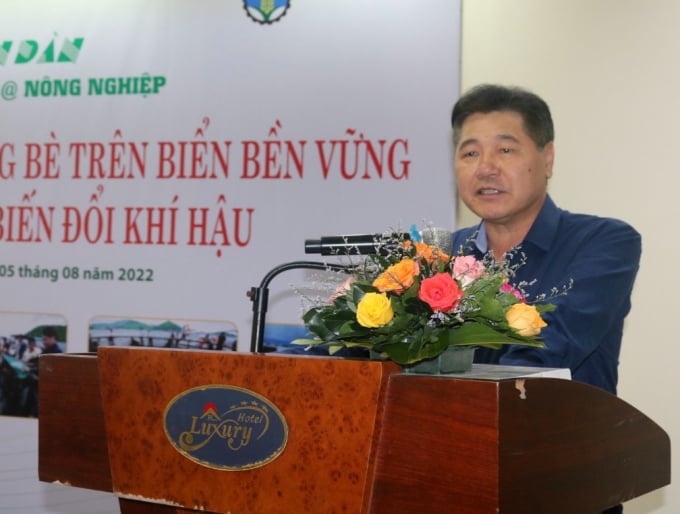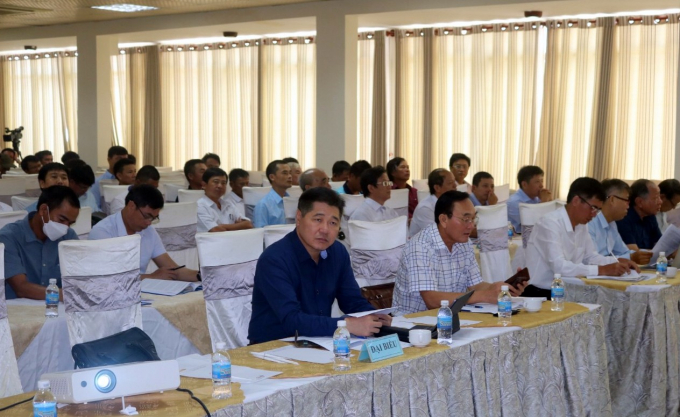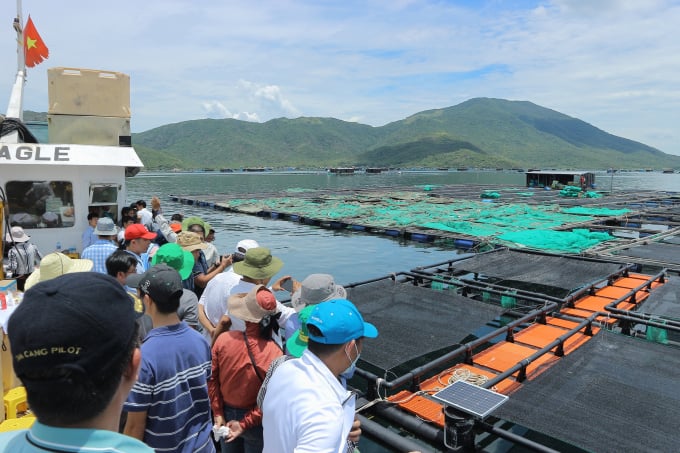November 27, 2025 | 22:24 GMT +7
November 27, 2025 | 22:24 GMT +7
Hotline: 0913.378.918
November 27, 2025 | 22:24 GMT +7
Hotline: 0913.378.918
An agricultural extension forum, themed “Sustainable development of marine cage culture in adaptation to climate change", was held in Nha Trang City on August 5.
The forum was jointly organized by the National Agricultural Extension Center and the Department of Agriculture and Rural Development of Khanh Hoa Province

Le Quoc Thanh, Director of the National Agricultural Extension Center. Photo: KS.
It was attended by representatives of relevant management agencies, enterprises and localities in 5 provinces of Binh Dinh, Ninh Thuan, Binh Thuan, Phu Yen and Khanh Hoa.
Le Quoc Thanh, Director of the National Agricultural Extension Center, said that he was very excited when this forum fully welcomed the diversity of attendees.
According to him, Vietnam has many favorable conditions for the development of mariculture, as the country has a long coastline of over 3,260 km, over 1 million sq.km of marine exclusive economic zone, more than 4,000 large and small islands, as well as many straits and bays.

The Forum was attended by representatives of relevant management agencies, enterprises and localities in 5 provinces. Photo: KS.
“Following the new approach of the Central Government, the Government and the Ministry of Agriculture and Rural Development (MARD), Vietnam has had a marine development strategy and a project approved by the Prime Minister.
“Currently, the Government is directing the MARD on how to harmoniously approach fishermen, fishery and fishing grounds, in the spirit of reducing fishing and increasing aquaculture. This is a view that is considered to be very important.
“The MARD has directed throughout its units how to form economic thinking in agricultural production, instead of production and output thinking as before. Now agriculture should be viewed with an economic mindset, which is an efficient or value-added mindset,” noted the Director.
The leader of the National Agricultural Extension Center stressed the importance of a strategy of integrating new technologies, new solutions, and new perspectives in mariculture, as it is related to not only fishermen but also socio-economic development, especially the marine environment. Aquaculture has the involvement of not only the Directorate of Fisheries and National Agricultural Extension Center, but also all agencies of the Ministry and localities.

Farmers visit the model of mariculture with HDPE cages in Van Phong Bay. Photo: KS.
He raised the question of how mariculture should be conducted in the coming period, and expressed his hope to hear suggestions on sustainable marine farming solutions from experts, managers, businesses and experienced fishermen.
“At the same time, I expect the forum to focus on discussing forms of mariculture. It is impossible to conduct mariculture production in the old way like, for example, each fisherman goes to the sea to feed the fish, each fisherman sells the products and another finds technological solutions. Instead, it needs to be reorganized, possibly in the form of cooperatives, groups or associations. Along with that, it is necessary to connect mariculture with the market and build brand names for marine farming,” he noted.
According to the Directorate of Fisheries, the whole country raised 9,000 ha of marine fish of various types in 2021, with 4 million m3 of cages, producing a total output of 57,837 tons of seafood. Over the past, Vietnam's mariculture has experienced strong changes, helping to create jobs, improve living standards and promote socio-economic development in seas and islands.
However, according to the Directorate of Fisheries, mariculture in general and marine fish farming in particular is still being conducted spontaneously. At the same time, there is a shortage of detailed planning, infrastructure conditions are still limited, and the production technical level of the people has not met the requirements.
Additionally, science and technology in seed production is limited and ineffective. Farming technology and the system of cages adapted to the weather in Vietnam have not been developed yet. There have not been standard procedures, studies and tests on some cultured subjects.
In the process of farming, the use of trash fish as food easily pollutes the environment. Laborers engaged in marine fish cage farming lack knowledge of science and technology as well as experience in operation and have limited awareness of protecting the environment. Meanwhile, there is a limited number of large enterprises involved in marine farming.
According to Dr. Huynh Minh Sang from the Institute of Oceanography, more and more new technologies are being developed and applied to the aquaculture sector.
“New and breakthrough technologies will enhance the production and quality of global seafood, making it possible to revolutionize aquaculture if it is recognized and developed properly,” he said.
Translated by Phuong Ha

(VAN) According to Mr. Vo Minh Thanh, Director of the Tay Ninh Department of Agriculture and Environment, Resolution 57 has created a new development pathway for the locality, shifting from traditional toward modern agriculture.
/2025/11/26/4909-2-154329_878.jpg)
(VAN) Pearl grouper farming in HDPE cages not only delivers economic efficiency but also contributes to protecting the environment, creating jobs, and promoting marine-based experiential tourism.

(VAN) The model of making a living under the forest canopy through the agroforestry system in Van Son commune, Bac Ninh province, is expected to generate an annual income of approximately VND 30 million/ha.

(VAN) Many enterprises in Can Tho are harnessing natural energy and reducing greenhouse gas emissions in their production processes, thereby contributing to the promotion of a sustainable green transition.
/2025/11/24/3536-2-112800_176.jpg)
(VAN) Dong Nai now has tens of thousands of hectares of forests certified for sustainable management, and this area will continue to be expanded in the coming period.

(VAN) Vinh Ha hamlet (Dai Xuyen commune, Hanoi) is shifting away from small-scale farming as households adopt bioscurity into their breeder chicken models.

(VAN) Heavy rains make aquatic species more vulnerable to disease. Proactive water management and high-tech systems help farmers prevent outbreaks and protect yields.